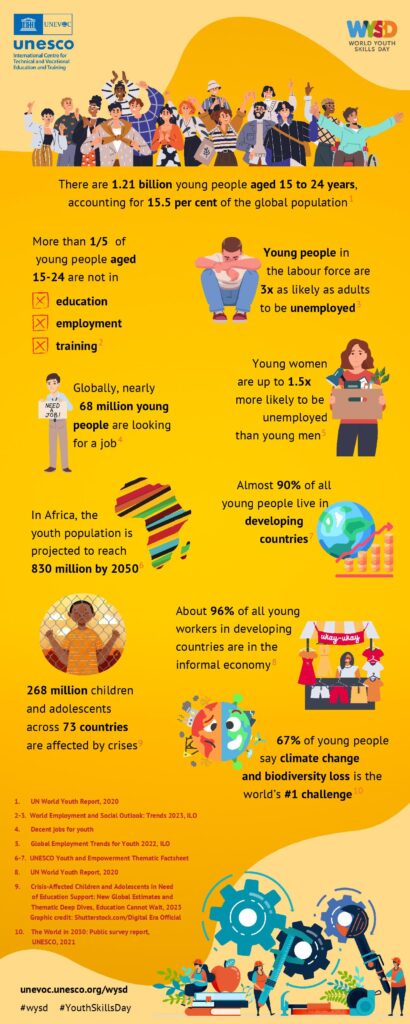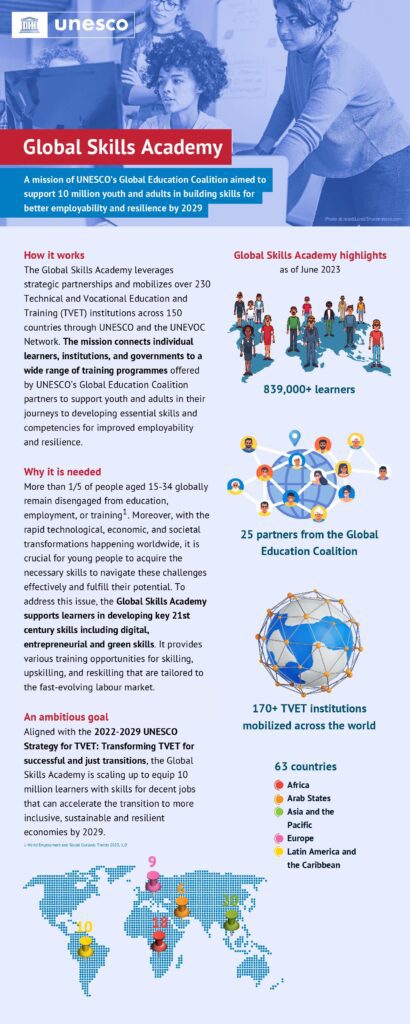In today’s rapidly changing world, where technological advancements and global transformations are reshaping every aspect of our lives, the importance of skilling individuals for the future cannot be overstated.

In today’s rapidly changing world, where technological advancements and global transformations are reshaping every aspect of our lives, the importance of skilling individuals for the future cannot be overstated.
As we strive to create a society that is adaptable, innovative, and equipped to thrive in the face of uncertainty, it is crucial to invest in the development of our teachers, trainers, and youth.
The education landscape in India is undergoing a significant paradigm shift, with a growing emphasis on holistic learning and the acquisition of 21st-century skills.
Recent reports indicate that the Indian education industry recognizes the urgent need to bridge the gap between traditional teaching methods and the evolving demands of the future.
This recognition has led to a focus on skilling teachers, trainers, and youth to prepare them for the transformative future that lies ahead.

Skilling teachers is essential as they play a pivotal role in shaping the minds of the next generation. By equipping them with the necessary skills and knowledge, we empower them to create dynamic and engaging learning environments that foster critical thinking, problem-solving, and creativity.
Moreover, trained teachers act as catalysts for change, driving innovation and embracing emerging technologies to enhance the quality of education.
Similarly, skilling trainers and youth is equally vital. Trainers who possess updated expertise and pedagogical skills can effectively impart specialized knowledge to aspiring professionals in various fields.
Furthermore, empowering the youth with relevant skills and competencies ensures their preparedness to enter the workforce and contribute to the nation’s economic growth.
The Role of Teachers in a Transformative Future
In the ever-evolving education landscape, teachers hold a pivotal position in shaping the future of our society. With the advent of technology and the changing needs of learners, the role of teachers has undergone a significant transformation.

Recent reports from the Indian education industry highlight the pressing need for teachers to acquire new skills to effectively navigate these changes and prepare students for a transformative future.
Traditionally, teachers were seen as disseminators of knowledge, imparting information to students. However, in today’s dynamic environment, teachers are expected to go beyond mere transmission of facts and figures.
They are increasingly becoming facilitators of learning, guiding students to develop critical thinking, problem-solving, and collaboration skills. Modern classrooms encourage student-centered approaches, where teachers act as mentors, encouraging exploration and fostering a growth mindset.
To meet the demands of the future, teachers need to acquire new skills that align with the changing educational paradigms. They must become adept in leveraging technology as an instructional tool, utilizing digital resources and platforms to enhance learning experiences.
Additionally, teachers should possess strong communication and interpersonal skills to foster positive relationships with students, parents, and the community. Continuous professional development programs and training initiatives are essential to equip teachers with the necessary skills for this transformative future.
Skilled teachers have a profound impact on students’ learning outcomes. Research indicates that students taught by highly effective teachers achieve significantly better academic results, exhibit higher engagement levels, and develop essential life skills.
Skilled teachers create inclusive and supportive learning environments, cater to diverse learning needs, and adapt instructional strategies to suit individual students’ strengths and weaknesses.
By nurturing a love for learning and encouraging students’ curiosity, skilled teachers lay the foundation for lifelong learning and success.
Empowering Trainers for the Future of Work
The nature of work is undergoing a rapid transformation, driven by technological advancements and shifting industry landscapes.

To succeed in the future job market, individuals must possess a diverse set of skills that go beyond traditional academic knowledge.
Reports from the Indian Education Industry emphasize the need for trainers to play a crucial role in equipping individuals with the relevant job skills required to thrive in this dynamic environment.
As automation and artificial intelligence reshape industries, the demand for specific technical skills is evolving. Future jobs will require a blend of technical expertise, critical thinking, problem-solving, creativity, and adaptability.
Soft skills such as communication, collaboration, and emotional intelligence are also gaining prominence as employers seek well-rounded professionals who can effectively navigate the complexities of the workplace.
Trainers hold a significant responsibility in preparing individuals for the future of work. They provide specialized training and guidance to bridge the gap between educational qualifications and industry requirements.
Trainers impart practical knowledge, share real-world experiences, and facilitate hands-on learning opportunities that simulate workplace scenarios. By aligning training programs with industry needs, trainers play a crucial role in nurturing a skilled workforce that meets the demands of the job market.
To meet the evolving demands of a dynamic job market, it is essential to upskill trainers themselves. Continuous professional development programs are crucial to equip trainers with the latest industry insights, technological advancements, and pedagogical strategies.
By staying abreast of emerging trends and tools, trainers can effectively prepare individuals for the challenges and opportunities of the future.
Empowering trainers with the necessary skills and knowledge is vital for ensuring the employability and career growth of individuals. Trainers who possess updated expertise and pedagogical excellence can create impactful learning experiences, instil confidence in learners, and inspire them to pursue lifelong learning.
The Indian Education Industry recognizes the importance of upskilling trainers and is actively investing in training programs and initiatives to enhance their capabilities.
Equipping Youth with Future-Ready Skills
Preparing the youth for the challenges of the future is of paramount importance in the Indian education landscape.

As we navigate a rapidly changing world driven by technological advancements and global transformations, it is crucial to equip the youth with the skills and competencies necessary to thrive in the 21st century.
Recent reports from the Indian Education Industry underscore the need to go beyond traditional academic knowledge and focus on holistic skill development.
The future job market demands a combination of technical expertise, critical thinking, creativity, adaptability, and strong communication skills.
Moreover, as automation and artificial intelligence continue to reshape industries, the ability to collaborate, solve complex problems, and navigate digital platforms is becoming increasingly crucial.
To address these demands, numerous initiatives and programs have been launched to skill and empower youth across India.

Skill development schemes like the Pradhan Mantri Kaushal Vikas Yojana (PMKVY) have been implemented to enhance the employability of youth by providing industry-relevant training and certification.
These programs aim to bridge the gap between educations and the job market, equipping youth with practical skills that align with industry needs.
Furthermore, entrepreneurship programs have gained traction, encouraging youth to develop an entrepreneurial mindset and explore innovative solutions to societal challenges.
Startup incubators and accelerators provide mentorship, resources, and networking opportunities, fostering an ecosystem that nurtures young entrepreneurs and cultivates their business acumen.
In addition to skill development, the focus on holistic education has increased, emphasizing the importance of character building, emotional intelligence, and social awareness. Initiatives promoting values-based education, citizenship education, and experiential learning aim to shape well-rounded individuals who can contribute positively to society.
By equipping youth with future-ready skills, we pave the way for their success and ensure their active participation in nation-building.
The Indian Education Industry recognizes the significance of preparing youth for the challenges of the future and is actively working towards creating a comprehensive ecosystem that fosters skill development, entrepreneurship, and holistic education.
Strategies and Approaches for Skilling Teachers, Trainers, and Youth
For teachers, professional development programs play a vital role in enhancing their pedagogical skills and keeping them up-to-date with the latest educational practices.

These programs offer opportunities for teachers to engage in continuous learning, attend workshops, participate in conferences, and collaborate with peers.
The National Initiative for School Heads and Teachers Holistic Advancement (NISHTHA) program is a prominent example, providing comprehensive training to improve teaching methodologies, classroom management, and student assessment techniques.
Mentorship programs are also effective in skilling teachers by providing guidance, support, and personalized professional development. Experienced educators serve as mentors, sharing their expertise, best practices, and insights with novice teachers.
Mentorship programs help build a supportive network of educators and foster a culture of collaboration and growth within the teaching community.
When it comes to upskilling trainers, innovative methods are being employed. Online platforms and e-learning courses offer flexibility and accessibility, allowing trainers to acquire new skills at their own pace and convenience.
These platforms provide interactive modules, videos, and assessments, ensuring an engaging and personalized learning experience. Additionally, immersive learning experiences, such as virtual reality and augmented reality simulations, offer trainers practical hands-on training that replicates real-world scenarios.
To skill youth, various initiatives focus on vocational training and entrepreneurship programs. Skill India, launched by the Government of India, aims to provide vocational training to millions of young individuals, enabling them to acquire industry-specific skills and increase their employability.
Entrepreneurship programs, such as Atal Tinkering Labs and Atal Incubation Centers, foster an entrepreneurial mindset among youth, encouraging them to develop innovative solutions and start their own ventures.
These strategies and approaches are driven by the recognition that skilling teachers, trainers, and youth is essential for a transformative future.
The Indian education industry’s commitment to investing in professional development, mentorship, online learning platforms, vocational training, and entrepreneurship programs reflects its dedication to creating a skilled and empowered workforce.
To Conclude
Skilling teachers, trainers, and youth is crucial for a transformative future in the Indian education landscape.
The Indian Education Industry must continue to invest in skilling initiatives to ensure a sustainable and thriving society, where individuals are equipped with the necessary skills and competencies to succeed in a rapidly changing world. By doing so, we pave the way for a prosperous and inclusive future for all.
To ensure a sustainable and thriving society, ongoing investment in skilling initiatives is paramount. Continuous professional development for teachers, innovative approaches for upskilling trainers, and targeted programs for youth are essential components of a comprehensive skilling ecosystem.
By prioritizing and investing in skilling, we can create a workforce and society that is adaptable, innovative, and equipped for a transformative future.